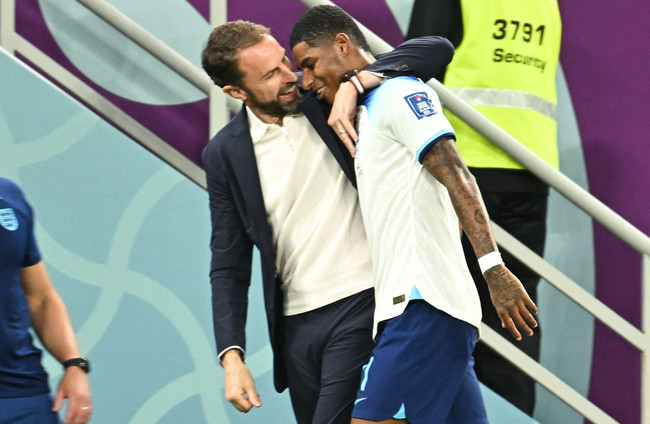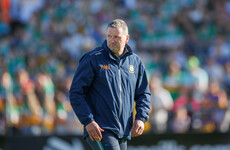REGARDLESS of what happens at this World Cup, Gareth Southgate is already England’s most successful manager since Alf Ramsey.
He is the first coach to guide England to a major tournament final since the 1966 World Cup win and only the second to take them to the semi-finals of a World Cup, after Bobby Robson.
The biggest problem previously was that with England, too often, team selection felt like a popularity contest.
A so-called golden generation emerged primarily in conjunction with Sven-Göran Eriksson’s five-and-a-half-year reign.
Too often during the Swedish coach’s time in charge, it felt like the manager simply picked the best 11 players available without enough regard for the system.
Consider the imbalanced midfield at Euro 2004 in their quarter-final loss to Portugal: Paul Scholes, Steven Gerrard, Frank Lampard, and David Beckham.
Four years later, Scholes had retired from international duty, but the other three aforementioned names remained, with Joe Cole taking the place of the Man United star, but the result was the same — England lost against Portugal on penalties.
Although that game was a rare exception, with Owen Hargreaves operating as a sitting midfielder, England generally played a 4-4-2 formation under Eriksson — a style that was admittedly more prevalent in international football at the time.
Star power, however, eclipsed tactics. It was a period when the English media had more influence and sway over public opinion compared to nowadays and perhaps fear of a backlash was part of Eriksson’s reluctance to drop the most high-profile individuals, but it simply meant the gameplan felt secondary and the Three Lions invariably played like a team reliant more on individual brilliance than a coherent strategy.
In a recent book by sportswriter Paul Hayward, ‘England Football: The Biography,’ he quotes Wayne Rooney: “There is one area I feel Sven could have done better and that was tactically. Under him we always played 4-4-2 or 4-4-1-1 and when you do that you always concede a lot of possession. You look back and ask why we never tried 4-3-3, especially given all the midfielders we had. But we had big characters in the dressing room: why didn’t I say something, or Lamps, or Becks? Why didn’t we, as a group, ask for a change? So the tactical side, it’s not just on Sven, it’s on all of us as players.”
Perhaps aware of the perception that England’s stars were indulged and the concern that he would merely represent a continuation of the Eriksson era — when former assistant boss Steve McClaren succeeded the Swede in the hotseat, one of his major initial decisions was to drop captain David Beckham from the squad.
Yet such a big statement was undermined by the fact that Beckham was then recalled by McClaren after a four-game absence, and featured as England slumped to a 3-2 defeat at the hands of Croatia, failing to qualify for Euro 2008 as a result.
The pattern continued in 2010, as Fabio Capello’s quartet of Steven Gerrard, Frank Lampard, Gareth Barry and James Milner (Beckham missed that World Cup through injury) were ultimately outclassed by Germany’s five-man midfield amid a demoralising 4-1 result.
Meanwhile, at Euro 2012, under Roy Hodgson, England were one of only four teams (Giovanni Trapattoni’s Republic of Ireland being another) who played 4-4-2, and again, the results were similar. They were beaten by Italy on penalties but the Azzurri were far more dominant than that outcome suggests — enjoying 64% possession and completing 815 passes to the Three Lions’ 320.
They did finally try different formations towards the latter half of Hodgson’s reign but by that time, England were in a transitional phase with the likes of Wayne Rooney, Steven Gerrard and Frank Lampard coming towards the end of their careers while players such as Harry Kane, Raheem Sterling and Kyle Walker were still young and relatively inexperienced.
Between Southgate and Ramsey, with the exception of the 1990 World Cup, England’s best footballing moments arguably came in the mid-90s under Terry Venables and Glenn Hoddle.
Unlike Eriksson and many of those that followed, both Venables and Hoddle often played with three at the back and the ensuing football was usually better to watch, perhaps reaching its zenith in the memorable 4-1 group stage win over a talented Dutch team at Euro ’96.
Southgate was a key part of Venables’ squad, in particular, notably missed a crucial penalty in the shootout against Germany in the semi-final during the England-hosted tournament 26 years ago.
Venables and Hoddle were well aware of England’s tendency to struggle with possession and so felt an extra man was needed in midfield.
They also were not afraid to make unpopular decisions — Hoddle in particular famously left Paul Gascoigne out of his 1998 World Cup squad and didn’t start David Beckham and Michael Owen in the early games of that competition despite considerable public pressure to do so.
Southgate, it seems, learned from the better moments under Hoddle and Venables, as well as the mistakes of Eriksson.
With the current England boss, you get the sense that the system always trumps the players. There may be an intermittent public clamour to pick stars like Phil Foden, Jack Grealish, and Trent Alexander-Arnold, but Southgate has for the most part shown a laudable ability to ignore the outside noise.
He may have played with a four-man defence at the World Cup thus far, but he is widely expected to revert to three at the back to accommodate more bodies in midfield once England come up against stronger opponents who are likely to dominate possession.
Many fans are still urging the former Aston Villa player to ‘take the handbrake off’ and unleash the biggest stars, just as previous managers frequently did, yet he has learned well from experience that the alternative, pragmatic approach is far more likely to yield success.
For the latest news coverage on the Fifa World Cup Qatar 2022, see here >












KOH
Build me up buttercup KOH